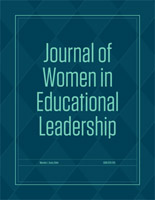Educational Administration, Department of

Journal of Women in Educational Leadership
Date of this Version
10-2007
Document Type
Article
Citation
Journal of Women in Educational Leadership, Vol. 5, No. 4-October 2007 ISSN: 1541-6224
Abstract
This study explores findings of interviews from 26 adolescent female participants residing in a correctional facility and ranging in age from 15 to 18 years (M = 17.12). All had experienced maltreatment and difficulty learning in school. The purpose was to examine participants' use of emotional language through modeling communicative strategies and requesting responses from two open-ended questions about their positive and negative experiences in life. Participants expressed positive and negative emotional words modeled by researchers. Preliminary findings suggested educational and communicative relevance as leaders plan programs for girls. Implications suggested that caution be used to determine whether the maltreated students suffered from alexithymia. Suggestions were offered for educators in leadership positions serving as members on mUltidisciplinary teams. As educators listen to conversational interactions from children and adolescents who have experienced maltreatment, it appears as though their use of language and communication skills is similar to non maltreated children. However, research suggests that some, but not all, maltreated individuals have experienced many haunting and troubling events that can have deleterious consequences, impacting their interactions with family, friends and authority figures. Some children are at-risk for cognitive, linguistic, social, and emotional problems. As Cicchetti (2004) pointed out, when individuals think of maltreated children, it is possible they imagine children manifesting characteristics such as bruises, burns, and malnutrition rather than the deleterious effects it may have on their socioemotional development. However, complex research that extends far beyond the expertise of educators in schools suggests that the likelihood of maladaptation and psychopathology increases in children who have been maltreated (Cicchetti, 2004). Thus, children who have experienced maltreatment will require services from a number of team members. In some instances, women in educational leadership positions will be best suited to provide a very important role in planning programs for these children.


Comments
Copyright © 2007 Pro>Active Publications. Used by permission.